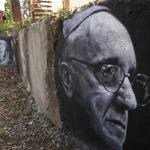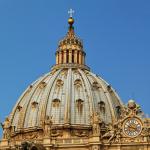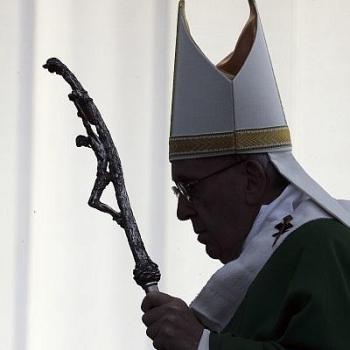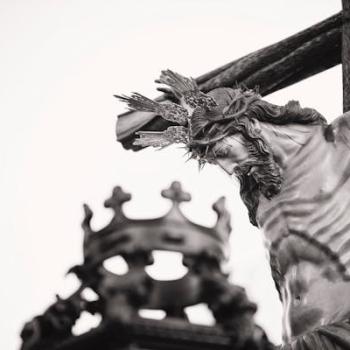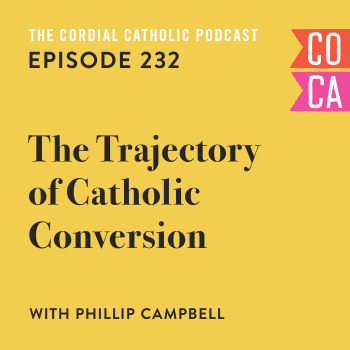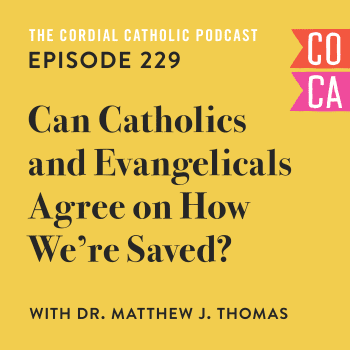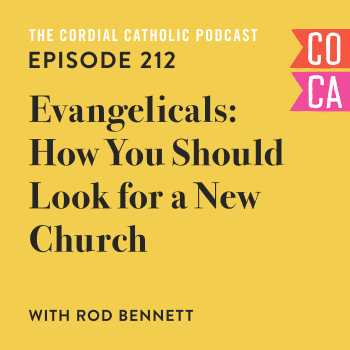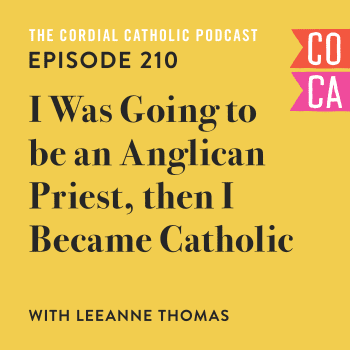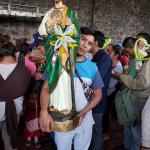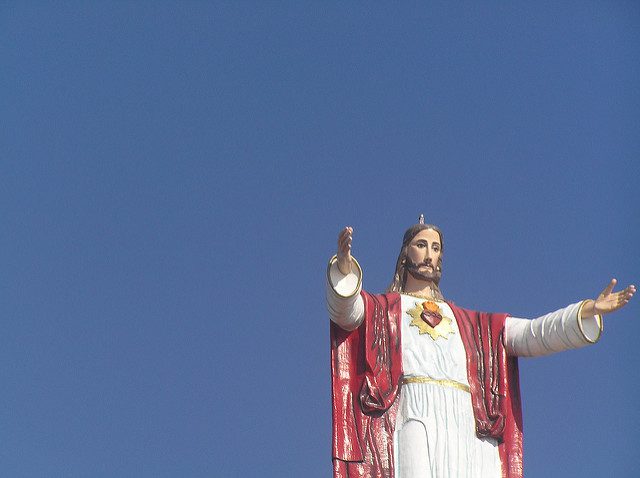
It’s Friday night after work and of all the places I could be, I’m here. In the basement of an elderly gentleman I’ve never met before surrounded by strangers. Celebrating the Mass.
A week earlier I’d received an e-mail from a Catholic Men’s Group I hadn’t attended in years. The group had been instrumental in helping me become Catholic but kind of petered out and when our son was born that July and my free time for things like fellowship when human beings older than just born kind of evaporated. But I got the e-mail and since both kids (we have two now) are relatively good sleepers these days and easy to put to bed my wife—my saintly wife—said, “What the heck, go for it.” And so I went.
Since I’d last been a part of the group it had significantly changed. They had a new chaplain priest and many of the men who I knew and would’ve recognized had vanished. Instead I found myself knocking on the front door of a man I’d never met; in a room of people I did not know. A tiny basement room converted into a makeshift chapel; celebrating an intimate Latin Mass with strangers.
As I followed along in the dog-earred red missal I waffled between feelings of extreme introversion and mild discomfort. My natural temperament is that of an introvert. New people and, worse, new social situations give me the willies. Here, in a stranger’s basement, celebrating Mass with people I didn’t know nearly knee to knee in the cramped little space was almost too much to bear. An internal struggle worthy of a character from Dostoevsky was playing out as I sang, “Kyrie eleison.”
More than a few times I slipped my phone out of my pocket and nearly sent a frantic message to my wife, “Quick, call and pretend there’s an emergency.”
But I stayed.
And something changed in my soul as I fought through the social discomfort, as I fought the urge to flee, as I concentrated more deeply on the prayers of the priest and the text of the Mass and the Eucharist.
Something profound, and holy.
As the first bells rang and the priest moved about the altar, back turned, something descended upon us in that tiny little basement room. Something electric. Some holy movement, charging the air, and I began to realize that instead of fighting the urge to run, to hide, to hang out somewhere more safe, I was suddenly fighting to hold back tears.
I was about to cry.
When I’d received that e-mail invitation, out of the blue, a couple weeks earlier it’d been as if the Holy Spirit himself had composed the thing. It felt right. I’d been struggling since the papal abuse scandal broke to know how I felt about being Catholic. And, before that, how I’d felt about God at all. I wasn’t, in any sense, ever imagining leaving the faith. Abandoning belief in God never crossed my mind. But I’d been, for a while, going through a thing.
For a while, indeed, it felt like many of my friends—close and distant—were leaving the faith. A regular line of leavers out the front door of belief and I’d been shaken. Friends, mentors, and role models. People I’d respected, deeply, for their work in the Christian community. People I’d looked up to and counted on and bonded with over our deep spiritual roots had decided to dig up and move right along.
It was nothing short of devastating to suddenly look around and be the last tree standing in a scorched earth forest.
And then the abuse crisis broke, on the back of everything else, and I began to bend underneath the weight.
It was, quite possibly, too much.
But then here I was. Burdened by all that abandonment, by the feeling of being abandoned: By friends and mentors and our bishops and the Church that I’d given so much to. It was weird, this basement chapel experience, but it was healing.
When those first bells rang and the priest began to move around the altar and pray and the simple bread and wine made this profound, miraculous, magnificent change into what I believe to be the body, blood, soul, and divinity of Jesus Christ—something happened.
In that moment it was as if time stopped and God knelt down himself to say, “Hey, I’m here. Did you lose me?”
In the most simple, profound way possible. Like Jesus waking up in the boat, surrounded by His disciples to say, “Be still,” to the storm. As if it were nothing. As if it were the most casual thing on earth.
And I was slain.
It reminded me of something I read from St. Thomas Aquinas a few months ago. Aquinas explained that reading, studying, and digging into philosophy and theology and the doctrine and dogma of the Church—or any belief system—can only get us so far. We can, he said, study forever, there is no end to the thinking we can do about God. But at some point God must come down to us.
At some point God must give us something of belief.
A morsel. A kernel. A mustard seed.
It’s that small thing which helps us to know God. Otherwise we’d be searching and looking and reading forever and a day.
I am, by no means, a scholar of Aquinas but I don’t think I’d be wrong in saying it is that small thing of experience which God gives us to help us in our belief. God says, “Here I am.” Because he is the I am.
I don’t know why other people are Catholic and, more pressingly, I don’t always know why some leave. There are, to be sure, badly formed Christians (often through no fault of their own). There are toxic worldviews, belief systems, and expressions of what it means to follow Christ that probably can’t rightly be called Christianity. There is also a sort spiritual anxiety, malaise, or depression that seems to be more and more common. (The number of “ex-Christians” I know is growing rapidly.)
For me, finding a Christian expression anchored firmly in two thousand years of history, with such a succinct and cohesive system of theology was utterly live-giving. When a friend recently admitted that his belief in God began to crumble when he questioned the veracity of his interpretation of the Bible, against so many competing views, I said, “Well, what if you weren’t meant to interpret it on your own in the first place?”
He was shocked. But that’s the point and principle of the Catholic Church.
(Thank God for that.)
But what I experienced in that cramped basement room, in a Latin Mass with a group of complete strangers, was a working of the Holy Spirit like I haven’t known in years. An absolute bomb, if I can put it that way. Like peace and grace and forgiveness and the there-ness of God just descended from the ceiling. Like a mantle, maybe. A cloak of utter comfort.
I am still Catholic because God came down, and comes down still. Because I have read, and studied, and looked and looked and it is, in my educated opinion, the most sensible and likely and ordinary thing in the world. And that makes it extraordinary to have lasted for so long. And being Catholic is not, in any sense, the most easy thing to do even if it has been for many of the last hundred years in most places on earth. God did not promise us an easy life, even though He did promise an easy yoke—being Catholic does not mean the perfect life, but it does promise peace.
I am still Catholic because above and beyond all of this God is. Above all of my intellectual ascent to an ancient creed and ancient religion there is a God that my experience cannot deny. He is there, in a tiny basement chapel, in a tiny piece of bread if only we stay (even when the most natural urge on earth is to flee). He is there, in an undeniable tidal wave of grace, in a tiny and massive experience which connects my thinking and reading and struggling to a God who is, from the beginning of time, God.

